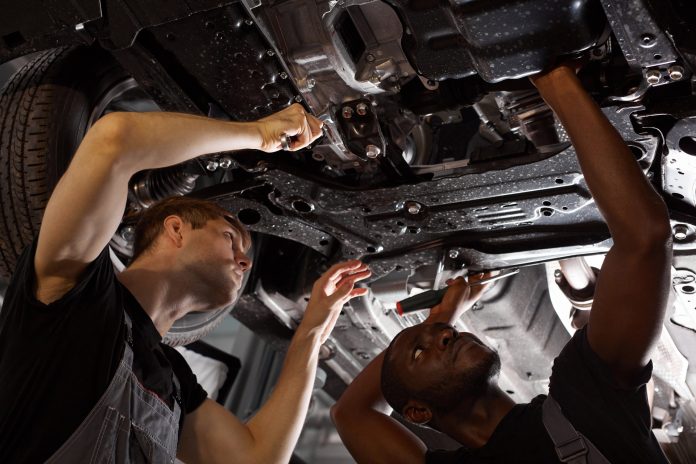Greg Miller knows just how hard it has become to attract and hire school bus mechanics.
“A lot of it is word of mouth,” said the owner of Miller Transportation, which operates school and charter buses in Indiana and Kentucky. “We want to establish a positive working atmosphere so the bus mechanics we have will tell their friends we are a good place to work. This is probably the biggest way to hire good mechanics.”
The company starts new mechanics at $18 an hour, while those with more experience can earn $36 an hour.
Miller said he and his company prioritize an applicant’s character when hiring. “The first thing we are looking for is a person with good character who is willing to work. We can take a person and turn them into a good mechanic, but we want a good individual,” he explained.
Another thing Miller looks for in a mechanic is someone who really likes to work on engines and vehicles. He noted that many good mechanics don’t consider fixing vehicles to be a job. Some grew up fixing engines or tinkering for fun. Some grew up on farms that required them to know about repairing engines and other equipment. Often the mechanics will go home after their day on the job and find more engines or items to fix.
“Do they enjoy being a mechanic? Do they do it after work? Is this their passion? Some of our mechanics had fathers who were mechanics,” Milled added.
He added that the company sends technicians to training programs so they can further their education or learn more about specialty repairs, such as air conditioning or engine emissions.
Word of mouth aside, companies like Miller’s and school districts nationwide are still suffering through mechanic and technician shortages that are every bit as bad as those affecting school bus drivers. The trend of more experienced mechanics retiring only continues even as a change in technology alongside the advent of electric school buses is evolving the work that is necessary to keep the vehicles in reliable and safe working order.
In that same vane, a growing number of the younger generation or those seeking second careers could be attracted to the school bus industry by more technical work as well as the security of working for public agencies. But a pipeline is still needed to prepare many of these workers for the role of school bus technician.
Those who earn the qualifications to become bus mechanics can be offered competitive starting salaries and benefits that are hard to find in private industries. School districts can expect their mechanics to receive some vocational training and then become a journeyman for up to four years.
An important advantage for younger people is that aspiring mechanics are paid while they are learning their trade. This means they are not facing large student loans at the beginning of their careers. Another advantage is that school bus mechanics can join state retirement systems that are not subject to the volatility of 401(k) plans. Many can begin collecting retirement money in their mid-50s and then take another job within the industry.
Mike Simmons, the public school program coordinator for transportation at the Arkansas Department of Education, said applicants in his state don’t need specific formal education or certification to become a bus mechanic. However, there has been a push toward attending career and technical education centers (CTE) within the state. An $18 million facility was recently opened to offer training specifically for bus mechanics.
Simmons said more people who don’t want to go to college are going to career and technical centers and trade schools.
“There have been several new state-of-the-art CTE centers that have opened in the last few years that are at capacity,” he noted.
An important advantage to having a career as a school bus mechanic includes a great retirement system. “Arkansas Teacher Retirement is one of the best retirement systems around. In addition, the health benefits are very good also when working for a public-school district,” Simmons added.
But amid the historic bus driver shortage, becoming a mechanic could also mean getting a commercial driver’s license to help cover routes. Many mechanics love to fix engines but they may be less interested in driving a bus full of kids. “A downside is the fact that most mechanics in school districts now have to drive a bus route due to the driver shortage,” said Simmons.
There are plenty of training opportunities for bus mechanics, but the state has no set requirements for mechanics. “As far as the requirements for Arkansas school bus mechanics, we have no minimum requirements to be hired,” Simmons explained. “That is strictly up to each individual school district. Arkansas does have a long-standing, very active school bus mechanic association that provides professional development for school bus mechanics each summer.
“The Arkansas School Bus Mechanics Association (ASBMA) has been around for over 70 years. It is arguably the oldest and largest association of its type in the country,” he continued.
Ray Cynova, the transportation director for Pottsville Schools District, located about 70 miles northwest of Little Rock, Arkansas, said prospective bus mechanics can get training at area technical schools. Training also remains available in high school classes to help school districts that are competing for the best mechanics or at least an opportunity to groom them.
“We can’t compete with truck dealerships dollar for dollar, but we can offer good benefits,” said Cynova. “We work during the day, and we don’t have [to] work weekends and nights unless a bus breaks down. We also get all government holidays off.”
The mechanics also get full retirement benefits through the Arkansas Teachers Retirement program. A school bus mechanic who has worked for 28 years is eligible for full retirement benefits. Many bus mechanics continue working while collecting a large retirement check.
“If you are going to be a bus mechanic you have [to have] experience with fixing engines. You also must love kids because you may have to drive the bus,” Cynova added. “A bus mechanic can start at $36,000 but if the individual drives a bus, the salary is about $45,000. And bus mechanics may have to drive as a substitute.”
Anthony Hunt, the president of the Arkansas Association of Pupil Transportation and head technician and transportation director for Valley View Public Schools, said well-qualified mechanics and especially those who know about computers can earn a good income. Most buses today use computers and higher-level electronic technology.
“Mechanics now are called technicians, so we are now hiring technicians. They must be well-equipped with technical and computer skills. As we struggle to get people trained, we take a week out of each summer to open for classes,” said Hunt. “We try to give as much training as possible.”
He is also pleased with the retirement system for school bus mechanics in Arkansas.
“After 28 years in the teacher’s association you can retire. I am 44 years old, and I can retire in six years. I will get a good pension and if I want to, I can continue working,” he commented. “With being a school bus mechanic, there is a light at the end of the tunnel. You can work as a truck mechanic and maybe you will get a 401(k). We are transporting the world’s most precious cargo.”
Related: (STN Podcast E125) Shop Talk: Cracking Open the School Bus Mechanic Shortage
Related: (STN Podcast E124) Thrown A Wrench: Insights From School Bus Manufacturers & Mechanics
Related: Hiring During a School Bus Technician Shortage
Related: School Bus Mechanic on the Benefits of Diesel Mechanic Colleges
There are also many good opportunities for up-and-coming bus mechanics in Florida, for example. There, those who complete training programs, complete an apprenticeship, or otherwise meet the requirements for the position can earn a good salary. With bus mechanic apprenticeship programs, the employer creates the standards and then the state education department oversees instruction to ensure that the standards are met.
“The students we have are working with certified diesel mechanics,” said Dr. Jeff Arnott, executive director of secondary and post-secondary education for the School District of Osceola County south of Orlando. “We want to encourage more young people to pursue trades and we want them to know more about our registered apprenticeship programs.”
He noted that students also learn about safety and procedures in the classroom, and they hone the necessary skills they need to earn their nationally recognized industry certifications. The training is free to the students, and they are paid during their apprenticeship, which lasts about two to three years.
When they complete the apprenticeship, mechanics start at a salary of $50,000 a year, Arnott added. The median annual family income in the area is about $55,000.
The students are registered through Osceola Technical College, but instruction takes place while on the job and is supplemented with classes at night. They can receive a State of Florida Journeyman’s License issued by the Florida Department of Education.
“When they complete [training], they get a raise in pay. That is agreed upon when the apprenticeship is finalized. They get a wage and then they get another raise, and this is spelled out. This is the best kept secret in the world,” said Arnott.
He said he is seeing a slow mind shift among younger people in terms of how they want to continue their education. “Most want to go to college and some want to go to trade school. The number of apprenticeships has risen,” he observed. “I think parents with high school age students are starting to recognize the benefits of the apprenticeship program. They are asking us which ones we have. This is a good trend.”
“Being a journeyman is a technical professional thing. It shows that you are good at this profession and that you can meet this standard to repair buses. There are some mechanics who make six figures. Wages are good,” Arnott continued.
Tommy Fitzpatrick, manager of vehicle maintenance for Broward County Public Schools, said there is always a need for bus mechanics. Those who can master some of the new technology can always find a good career path as a bus mechanic.
“We have two paths. You can become an apprentice or you can go to vocational school. We expect candidates for apprenticeships to pass a mechanical aptitude test. It can [take] several years for a person to complete an apprenticeship,” said Fitzpatrick. “A journeyman usually has four years of experience.”
Those who are learning to work on buses will work on brakes and electrical equipment. Fitzpatrick said he started at a shop in the 1980s and learned to be a mechanic by working alongside more experienced mechanics.
“I was basically a porter and I gained skills over time,” he shared.
Broward County school bus mechanics earn a good competitive salary, Fitzpatrick said, and they receive full benefits for themselves and their families. They also receive holidays and weekends off, and are eligible for the Florida Retirement System.
Related: School Bus Driver, Mechanic Among California Classified School Employees of Year
Related: Iowa Farmer, School Bus Mechanic Shares the Importance of Working Hard
Related: Veteran Iowa School Bus Mechanic Shares Knowledge of Industry
















